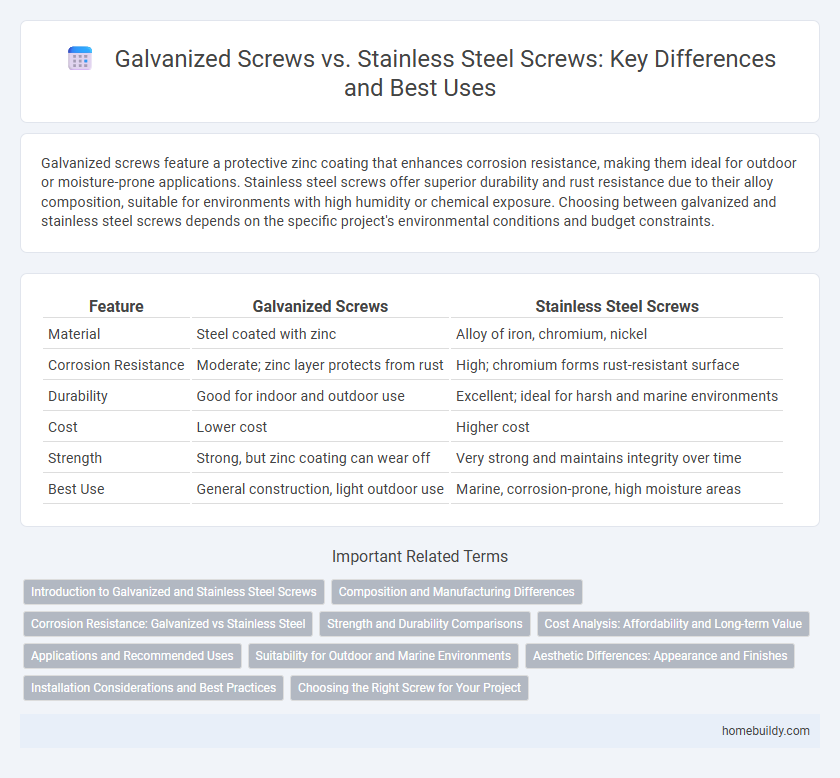Galvanized screws feature a protective zinc coating that enhances corrosion resistance, making them ideal for outdoor or moisture-prone applications. Stainless steel screws offer superior durability and rust resistance due to their alloy composition, suitable for environments with high humidity or chemical exposure. Choosing between galvanized and stainless steel screws depends on the specific project's environmental conditions and budget constraints.
Table of Comparison
| Feature | Galvanized Screws | Stainless Steel Screws |
|---|---|---|
| Material | Steel coated with zinc | Alloy of iron, chromium, nickel |
| Corrosion Resistance | Moderate; zinc layer protects from rust | High; chromium forms rust-resistant surface |
| Durability | Good for indoor and outdoor use | Excellent; ideal for harsh and marine environments |
| Cost | Lower cost | Higher cost |
| Strength | Strong, but zinc coating can wear off | Very strong and maintains integrity over time |
| Best Use | General construction, light outdoor use | Marine, corrosion-prone, high moisture areas |
Introduction to Galvanized and Stainless Steel Screws
Galvanized screws feature a protective zinc coating that enhances corrosion resistance, making them ideal for outdoor and humid environments. Stainless steel screws consist of an alloy containing chromium, providing superior durability, rust resistance, and strength for demanding applications. Both fastener types are selected based on environmental conditions and structural requirements to ensure optimal performance and longevity.
Composition and Manufacturing Differences
Galvanized screws consist of carbon steel cores coated with zinc through hot-dip galvanizing or electro-galvanizing processes, providing enhanced corrosion resistance by sacrificially protecting the steel beneath. Stainless steel screws are manufactured from alloys containing chromium, typically 10.5% or more, which forms a passive oxide layer, offering inherent rust resistance without the need for additional coatings. The manufacturing of stainless steel screws often involves cold working to increase strength, while galvanized screws rely primarily on their zinc coating for durability in corrosive environments.
Corrosion Resistance: Galvanized vs Stainless Steel
Galvanized screws feature a zinc coating that offers effective corrosion resistance in mild to moderately corrosive environments by protecting the steel core from oxidation. Stainless steel screws provide superior corrosion resistance through their chromium content, forming a passive oxide layer that withstands harsh conditions such as saltwater or acidic exposure. Choosing between galvanized and stainless steel screws depends on the specific environmental demands and longevity requirements of the application.
Strength and Durability Comparisons
Galvanized screws offer strong corrosion resistance due to their zinc coating, making them suitable for outdoor applications where moderate exposure to moisture occurs. Stainless steel screws provide superior strength and exceptional durability, resisting rust and corrosion even in harsh environments like marine or chemical settings. For projects requiring long-term reliability and maximum structural integrity, stainless steel screws outperform galvanized options.
Cost Analysis: Affordability and Long-term Value
Galvanized screws offer a lower upfront cost compared to stainless steel screws, making them more affordable for large-scale projects. However, stainless steel screws provide superior corrosion resistance and durability, reducing maintenance and replacement expenses over time. Evaluating the total cost of ownership reveals that stainless steel screws often yield better long-term value despite their higher initial price.
Applications and Recommended Uses
Galvanized screws are ideal for outdoor applications where corrosion resistance is needed but the environment is less aggressive, such as fencing, decking, and general construction projects. Stainless steel screws excel in highly corrosive environments including marine settings, food processing, and chemical plants due to their superior resistance to rust and staining. Choosing between these fasteners depends on exposure to moisture, chemical agents, and the need for long-term durability in demanding conditions.
Suitability for Outdoor and Marine Environments
Galvanized screws offer excellent corrosion resistance due to their zinc coating, making them suitable for many outdoor applications but can eventually rust in harsh marine environments. Stainless steel screws, especially those made from grades 316 or 304, provide superior resistance to saltwater corrosion and are ideal for marine constructions and prolonged outdoor exposure. Choosing stainless steel screws ensures durability and longevity when exposed to moisture, salt, and extreme weather conditions.
Aesthetic Differences: Appearance and Finishes
Galvanized screws feature a zinc coating that provides a matte or slightly rough finish, often appearing dull gray, which can develop a subtle patina over time due to oxidation. Stainless steel screws exhibit a smooth, shiny surface with a bright silver finish that resists tarnishing and maintains its aesthetic appeal longer in outdoor or decorative applications. The choice between these fasteners significantly impacts the visual integrity of projects requiring corrosion resistance combined with specific aesthetic preferences.
Installation Considerations and Best Practices
Galvanized screws require pre-drilling in hardwoods to prevent coating damage and ensure proper thread engagement, while stainless steel screws often allow direct driving due to their strength and corrosion resistance but may need pilot holes in dense materials. When installing galvanized screws, use compatible tools to avoid stripping the zinc coating, which can compromise corrosion protection, whereas stainless steel screws demand careful torque control to prevent galling and seizing. Best practices include applying lubricants or anti-seize compounds on stainless steel screws during installation and selecting screws with appropriate coatings or grades based on environmental exposure and substrate material.
Choosing the Right Screw for Your Project
Galvanized screws offer superior corrosion resistance for outdoor and moisture-prone environments due to their zinc coating, making them ideal for wood decking and fencing projects. Stainless steel screws provide excellent durability and rust prevention in harsh conditions, including marine or high-salinity applications where longevity is critical. Selecting the right screw depends on the specific environmental exposure, load requirements, and budget constraints to ensure optimal performance and project durability.
galvanized screws vs stainless steel screws Infographic

 homebuildy.com
homebuildy.com